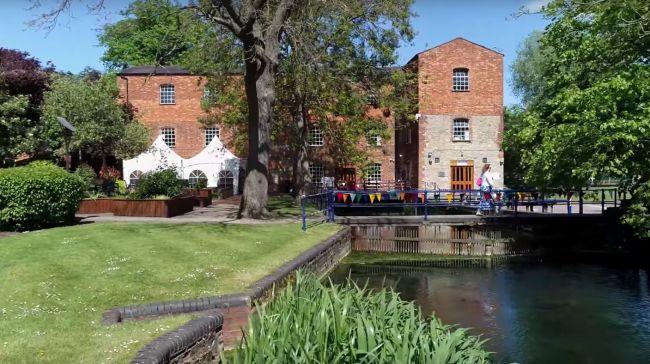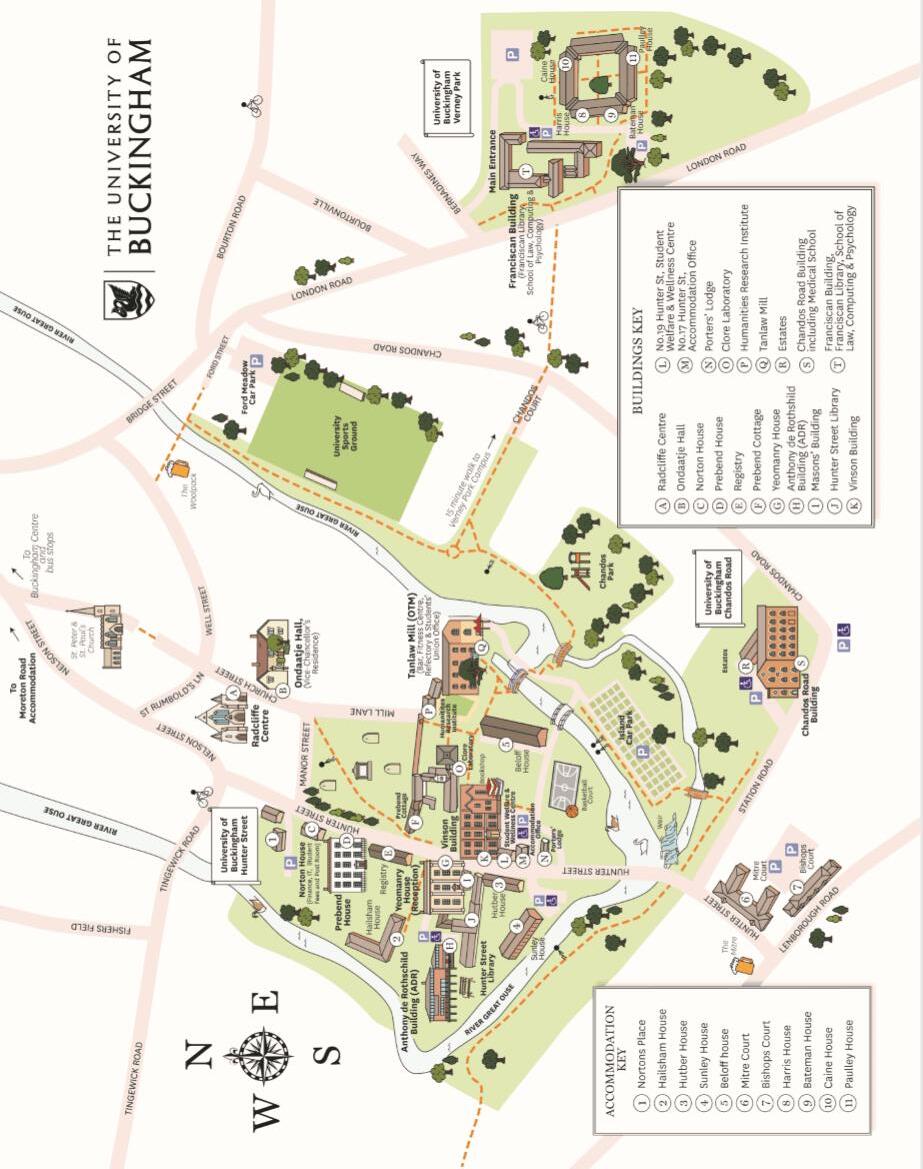Graduate Study in GARDEN HISTORY









The University of Buckingham’s Master’s programme in Garden History offers the opportunity to pursue research at Master’s level in any one of a wide range of garden- and landscaperelated topics: from explorations of individual sites; their designers, gardeners and owners; to studies of the social and political use of gardens, or aspects their of conservation, botany, ecology, horticulture, archaeology, buildings – and much else besides. While Individual research topics are closely focused, the approach of the course is to encourage students to take a broad view of the links between gardens and landscape, and of history and culture more generally. Recent papers on these themes have included a survey of travellers’ accounts of garden-visiting in the
eighteenth century; gardeners as philanthropists in the nineteenth century; the links between garden sculpture and imperialism; horticultural knowledge in seventeenth-century Holland; men’s fashion and flowers; and reappraisals of several gardenmakers. A suggestive list of topics can be seen on the ‘Symposium’ page of the Gardens Trust website. The choice of subject area is ultimately the student’s own.
The MA is awarded solely on the basis of the dissertation (there are no ‘exams’), and the relationship between you and your supervisor is therefore at the heart of the course. The maximum length for the MA dissertation recommended by the School of Humanities is 25,000 words (or
approximately 75 pages at a linespacing of 1.5), excluding notes and references. Student and supervisor meet regularly on a one-to-one basis to
discuss, plan, and review the dissertation as it develops through the year.
Some students know from the outset the precise subject on which they intend to work. For most, however, the definition of a research proposal is usually a gradual process, with the student starting with a general area of interest, and then focusing on a more closely defined topic as a result of further reading and consultation, usually with the Course Director. Most students do
not arrive at the final title of their dissertation until towards the end of the first Term, just before Christmas. The Course Director, David Marsh, is available to offer advice to prospective students who would like to discuss possible subjects for their research before they apply. He can be reached directly by email at david.marsh@buckingham.ac.uk.
Left: Detail from the titlepage of John Parkinson’s Paradisi in sole paradisus terrestris (London, 1629), dedicated to Queen Henriette Marie, consort of King Charles I. The Latin title puns on the author’s name: ‘Park-insun’.
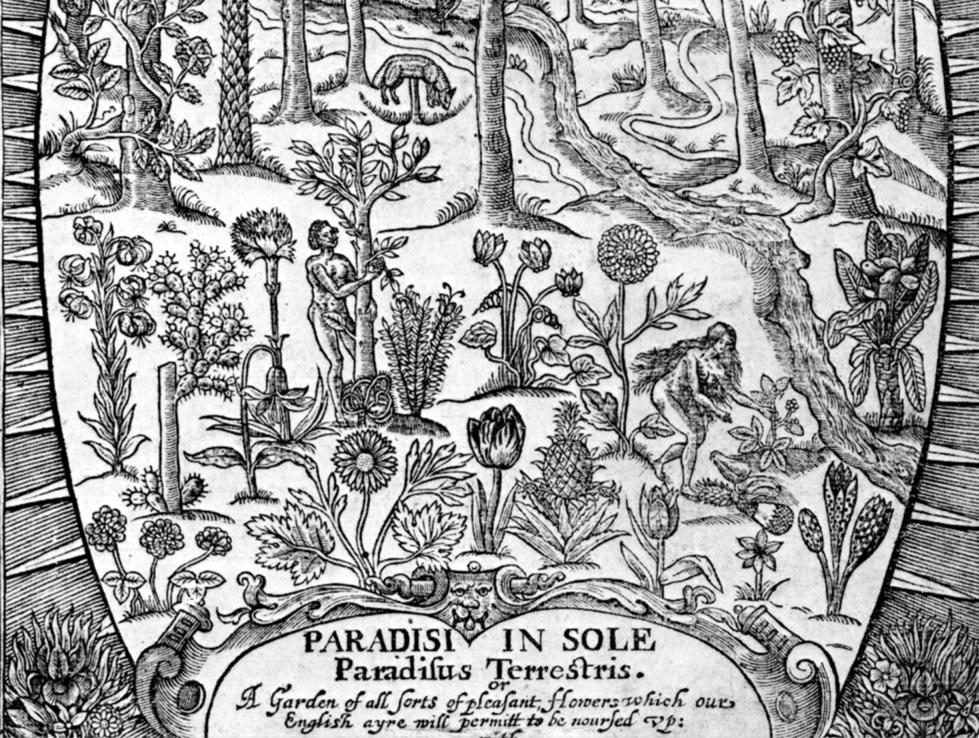
In addition to the seminar programmes and students’ one-to-one meetings with their supervisor, the programme also offers specialist classes on thesiswriting, referencing, and on how to use archival and on-line research resources. For those who need to work with manuscripts there is also a series of classes on palaeography (the reading of early handwriting) that will enable
students to acquire fluency in the reading of manuscript sources.
In addition to the support offered for the academic aspects of the student’s studies, each student has access to a Personal Tutor: an experienced member of the faculty who can provide assistance, in complete confidence, if the student encounters personal difficulties during the course of study.
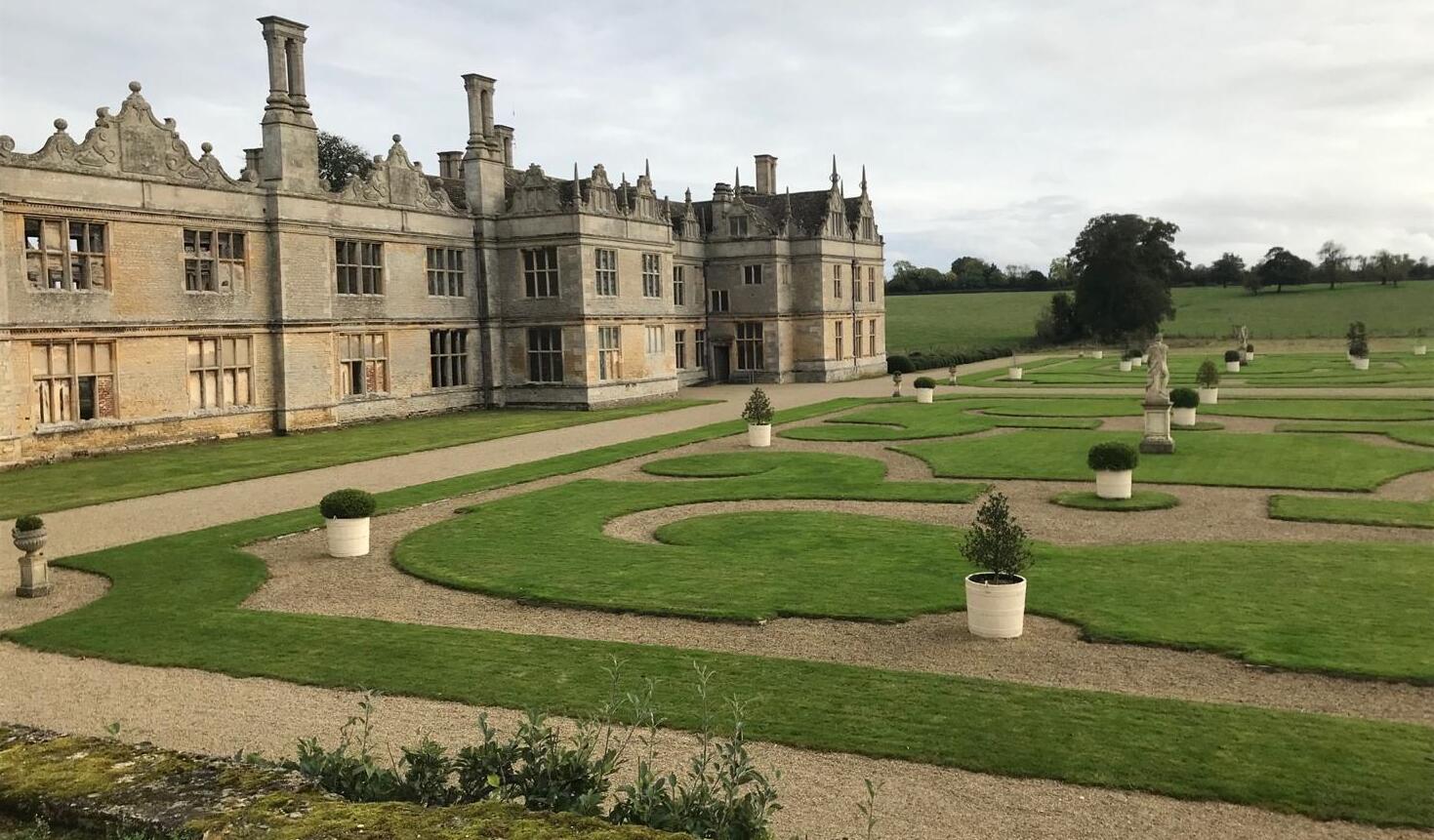 Above: Kirby Hall, Northamptonshire, was one of the great Elizabethan houses of England, first built for Sir Humphrey Stafford of Blatherwick, beginning in 1570. This view shows the reimagined late seventeenth-century parterre
Above: Kirby Hall, Northamptonshire, was one of the great Elizabethan houses of England, first built for Sir Humphrey Stafford of Blatherwick, beginning in 1570. This view shows the reimagined late seventeenth-century parterre
Private research and supervision are complemented by a rich programme of seminars and lectures which give students direct access to some of the United Kingdom’s most distinguished scholars in their field. Seminars will generally take place in the university’s London base in Bloomsbury, but background lectures will often be online.
can mix informally. This coming year’s seminars will include a series of casestudies of important gardens, organized chronologically, and led either by academic garden-historians or, in some case, by their scholarly owners.
These seminars will explore not only the history of particular gardens, but also what is involved in their management and conservation.
The seminars are of course academic events, with a talk by a visiting expert; but they also have a social dimension, bringing research students and senior scholars together to discuss matters of common interest in an informal and congenial atmosphere.
Each seminar starts at 6:30 pm, with an illustrated presentation by the visiting speaker and is followed by a 40-minute question-and-answer session. Particular events will be marked with a drinks reception at the end of the seminar, where students and faculty-members
In addition the seminar series, there will be a series of background lectures on wider garden and landscape history for each period.
At least once a year, research students also gather at the Humanities Research Institute in Buckingham for a concentrated day of seminar presentations (by both current students and visiting experts), and this is followed by a formal dinner with the speakers in the elegant surroundings of the Institute.
The programme for 2023-24 is as follows. Please note that all seminars will take place at the University of Buckingham’s offices at 51 Gower St, Bloomsbury, unless otherwise stated. Lectures will take place online.
Autumn Term 2023
Thursday 5 October Introductory Lecture Introduction to the course of research and study Dr David Marsh
Thursday 12 October Lecture Medieval Gardens Dr David Marsh
Thursday 19 October Seminar Garden Archaeology Dr Stephen Wass (Polyolbion Archaeology)
Thursday 2 November Seminar Research Skills for Garden History Dr Tamsin Macmillan (The Gardens Trust)
Thursday 9 November Lecture Tudor and Jacobean Gardens Dr David Marsh
Thursday 16 November Seminar (online TBC)
Case Study: Bramshill House, Hampshire Dr Paula Henderson (Historian and landscape consultant)
Thursday 23 November Lecture Issues in Garden Conservation Margie Hoffnung (Conservation Officer, the Gardens Trust)
Thursday 30 November Seminar The Landscape Park (subject TBC) Speaker TBC
Thursday 7 December Lecture Restoration and Baroque Gardens Dr David Marsh
Thursday 14 December Seminar Bramham Park, West Yorkshire Nick Lane Fox (Owner of Bramham Park)
Winter Term 2024
Thursday 4 January Lecture (online) The Early Eighteenth-Century Garden Dr David Marsh
Thursday 11 January Seminar Case Study: Holkham Hall, Norfolk The Earl of Leicester
Thursday 18 January Lecture The Landscape Garden Dr David Marsh
Thursday 25 January Seminar Case Study: Stourhead, Wiltshire
Thursday 1 February Lecture Picturesque and Regency Gardens: the ideas of Humphrey Repton
Dr Oliver Cox (Victoria and Albert Museum, London)
Dr David Marsh
Thursday 8 February Seminar Case Study: Brodsworth Hall, South Yorkshire Daniel Hale (Head Gardener at Brodsworth)
Thursday 15 February Lecture Victorian Gardens Dr David Marsh
Thursday 22 February Seminar Case Study: Belvoir Castle, Rutland The Duchess of Rutland
Thursday 29 February Lecture The Edwardian Garden Dr David Marsh
Thursday 7
March Lecture Twentieth-century Gardens Dr Katie Campbell (Garden historian)
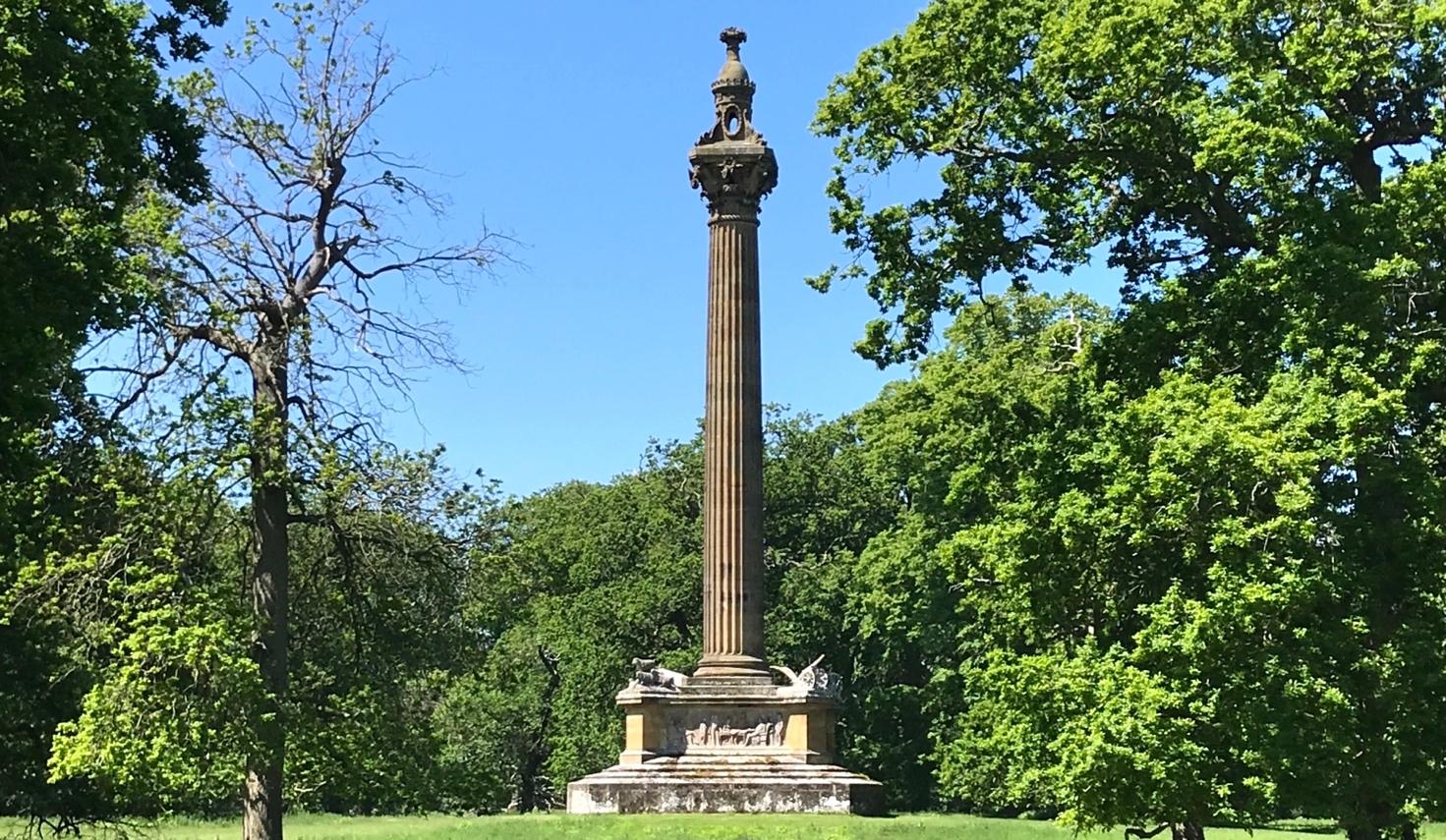
Thursday 14
March Seminar Case Study: Shute House, Wiltshire Dr Kate Felus (Designed-landscape historian)
Thursday 21 March Seminar Contemporary Gardens Tim Richardson (Garden historian)
Thursday 28 March Seminar Round-up Dr David Marsh
Please note that all seminars and lectures will take place at the University of Buckingham’s offices at 51 Gower St, Bloomsbury, unless otherwise stated. Details may be subject to change.
The programme includes four full-day field trips to historic gardens to link with the lecture and seminar series. These field trips will usually take place on Saturdays, and the full programme of dates will be made available on the University’s Garden History webpage closer to the start of the academic year. Each year, students are also invited to take part in a Research Day devoted to Garden History. This is a day-long programme, with a series of presentations by both Buckingham -based researchers and distinguished guest lecturers. This will take place in the University’s Vinson Building in Buckingham and usually concludes (weather permitting) with a drinks reception of the lawn of the Humanities Research Institute.
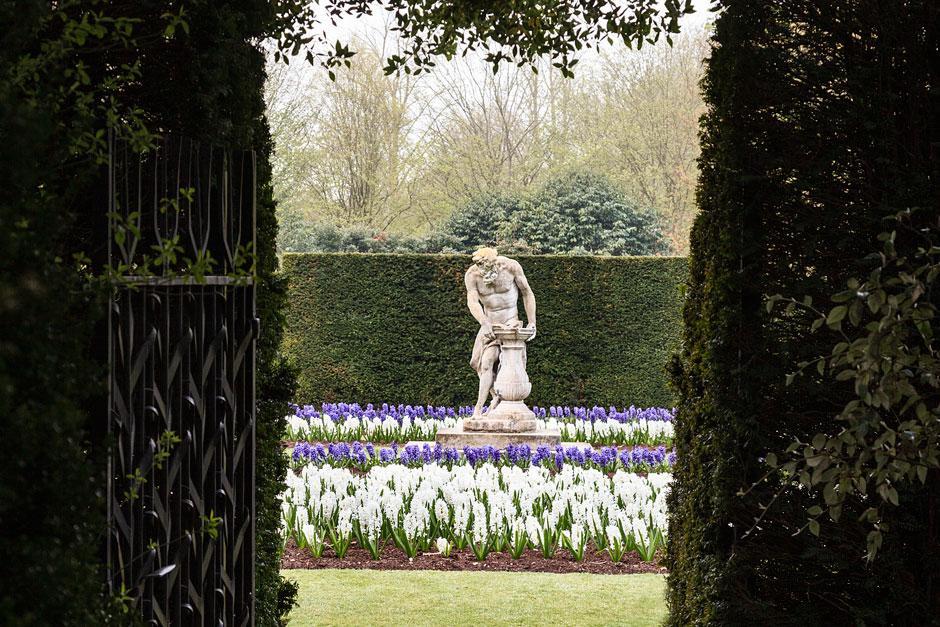
David Marsh was awarded his PhD in 2005 for a study of the ‘Gardens and Gardeners of Later-Stuart London’ and has been lecturing and supervising research in Garden History ever since, and has taught at the Institute of Historical Research, Birkbeck
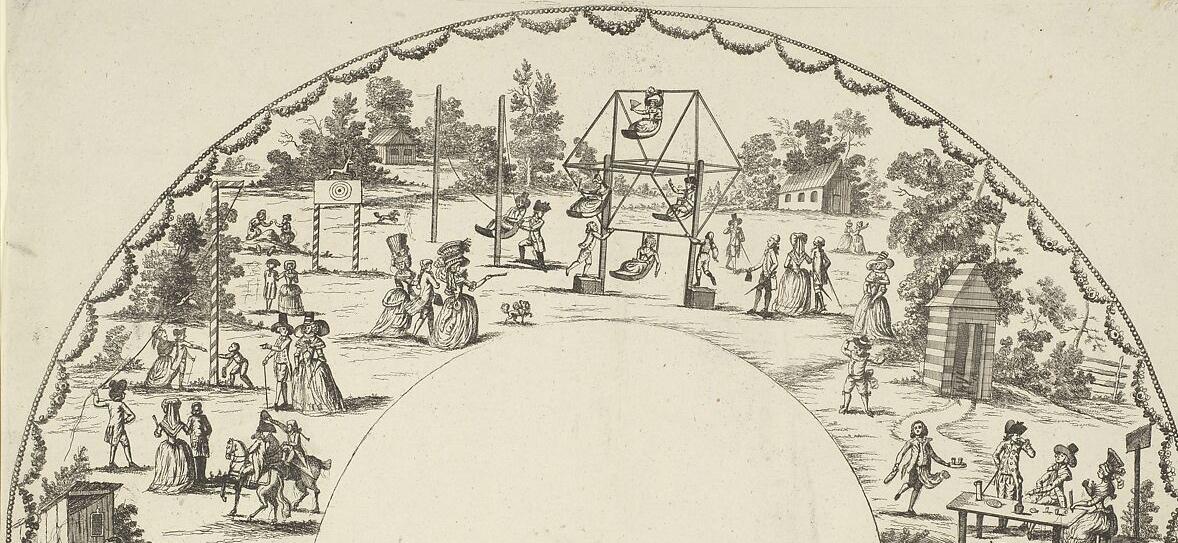
University of London, and the Garden Museum. He was co-convener of the History of Gardens and Designed Landscapes seminar at Institute of Historical Research, London University, from 2011-2022. He is a trustee of the Gardens Trust and chaired their Education Committee until early
2023. He set up and runs the Gardens Trust’s successful on -line lecture programme and is the author of their weekly blog about Garden History which can be found at https://thegardenstrust.blog
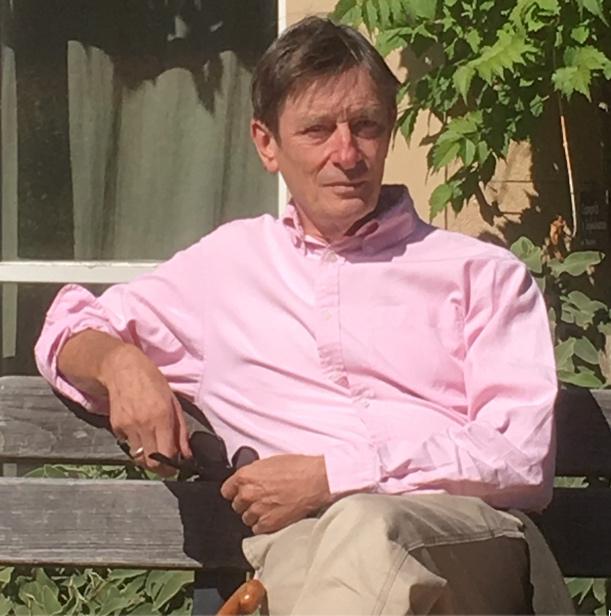
Writer, garden historian and lecturer, Dr Campbell has taught at Birkbeck, Bristol and Buckingham Universities, and writes for various publications and leads art and garden tours. Her most recent book, British Gardens in Time, accompanied a BBC TV series. Other books include Paradise of Exiles, Icons of 20th-century Landscape
Design and Policies & Pleasances: A Guide to Scotland’s Gardens. She is currently working on a book about how the Medici Villas reflect the changing ideas of the Renaissance
vision is to be a pioneer as the UK ’s most sustainable rural estate.
Lord Leicester (above, right) runs the family estate at Holkham in Norfolk. The Grade-I listed house sits in the middle of one of the largest and most significant landscape parks in the country. Recently, there has been a major restoration programme in the walled garden and vinery. Holkham’s
Dr Cox is a historian by training and teaches architectural and cultural history with a focus on the eighteenth century. Formerly a British Academy Research Fellow at the University of Oxford, he is now Head of Academic Partnerships at the Victoria and Albert Museum, leading on the strategic development of new academic partnerships that build on the V&A’s
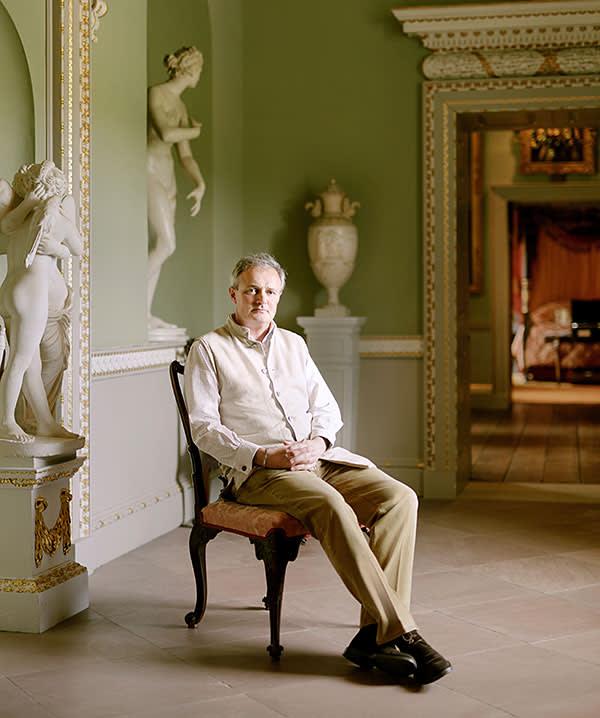
track record in innovative, interdisciplinary teaching and research.
Kate Felus (right) is a researcher and advisor on all aspects of the restoration, planning and management of historic parks and gardens. The author of The Secret Life of the Georgian Garden , she was the National Trust’s Garden Historian at Stowe House in Buckinghamshire, and involved in the massive restoration programme of that vast palace and its grounds that began in 1990. She has also been involved with work at Hestercombe and the National Trust’s first restoration of a Modernist building, the Erno Goldfinger House in Hampstead.
Daniel Hale has been in the horticulture industry for fifteen years. He gained experience as a landscape gardener in his early career before moving into historic gardens. He was acting Head Gardener at Wentworth Castle gardens before joining English Heritage ,and has been Head Gardener at Brodsworth
Hall since 2015, where he taken a key role in the restoration of the gardens.
Paula Henderson is an independent scholar who specializes in the architectural and garden history of Tudor and Stuart Britain. Her book, The Tudor House and Garden: Architecture and Landscape in the Sixteenth and Early Seventeenth Centuries (New Haven and London: Yale University
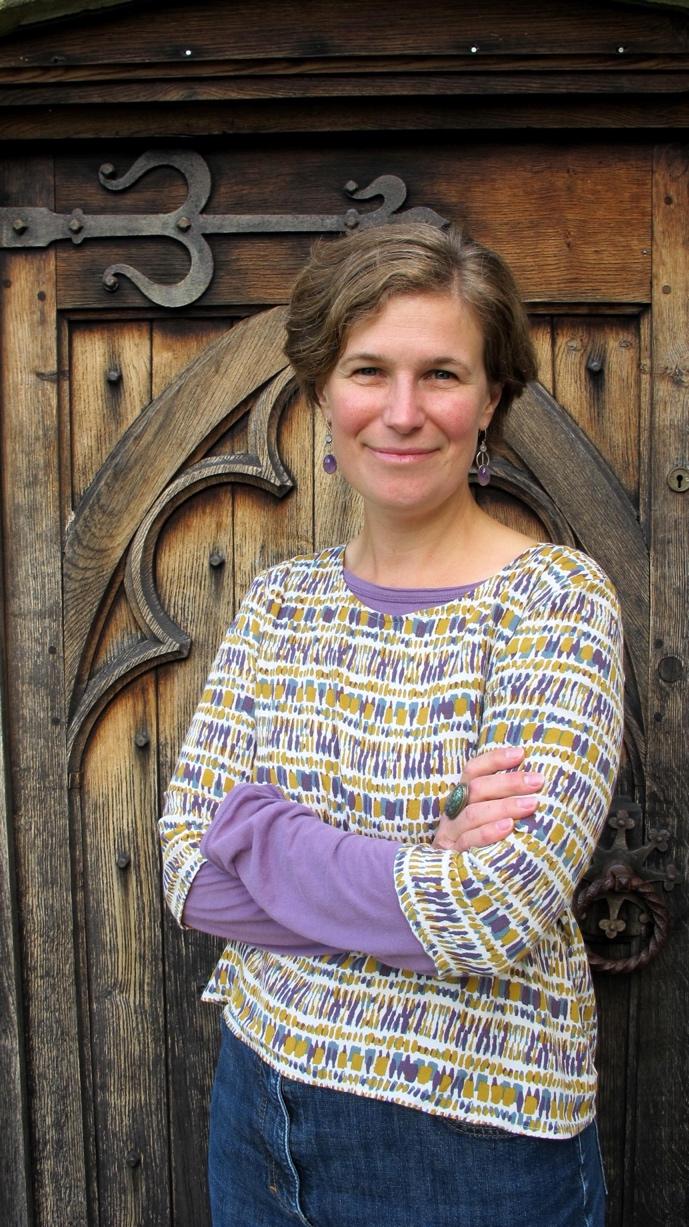
Press, 2005) won the Berger Prize for British Art History. Dr Henderson has worked as a consultant and expert witness for several important historic gardens, including Bramshill and Lyveden.
Margie Hoffnung
Margie Hoffnung is a horticulturist who has worked at Westonbirt Arboretum and at Highgrove, as well as with Rosemary Verey and Lady Mary Keen. She completed an MSc in the Conservation of Historic Gardens and Cultural Landscapes at Bath, and has worked for the Gardens Trust since 2013.

Bramham Horse Trials and the Leeds Music Festival. Dr Tamsin McMillan
Tamsin worked on the English Heritage Register of Parks and Gardens of Special Historic Interest before spending five years as an Historic Environment Adviser.
Nick Lane Fox
Nick Lane Fox is the owner of Bramham Park, a Grade-I listed house near Leeds where he is overseeing a large-scale restoration project of the early eighteenth-century gardens and parkland. Bramham lies at the centre of a 2,265-hectare agricultural estate where, in addition to farming and forestry, he has helped develop an events programme including the
Emma Manners, Duchess of Rutland
The Duchess of Rutland (above) is châtelaine of Belvoir Castle, the main residence of the Manners family since Tudor times, which was extensively rebuilt between 1801 and 1832 and has a series of extensive gardens set within an even larger landscape park. She is author of several books including Capability Brown & Belvoir:
Discovering a Lost Landscape which tells the story of how Brown’s plans were rediscovered and then used to complete the work on Belvoir’s landscape that Brown himself never got to finish.
the more quirky horticulture that does not necessarily appear in the Chelsea Flower Show.
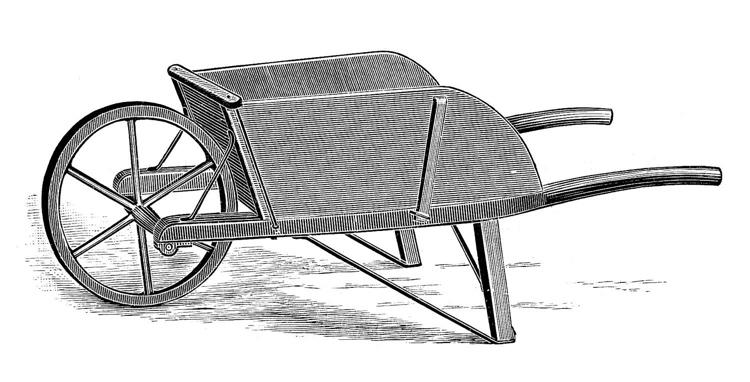
Tim Richardson
Tim Richardson (below) is a gardenwriter, historian and critic, and an advisor to the National Trust on gardens. His many books include The Arcadian Friends, Avant Gardeners, and The New English Garden. He regularly contributes to the Daily Telegraph and Country Life, as well as being the Director of the Chelsea Fringe Festival, an extremely successful ‘alternative’ garden event, celebrating
Christopher Weddell
Christopher Weddell has been Senior Gardens Advisor at English Heritage since 2008, setting and monitoring the standards of garden presentation and curation at English Heritage’s garden sites, advising and supporting garden teams and property staff, and supporting garden projects at (among other places) Eltham Palace, Walmer Castle, Marble Hill, Wrest Park, and Witley Court. He has also worked for the National Trust, for the Royal Botanic Gardens, Kew, and for the Royal Horticultural Society.
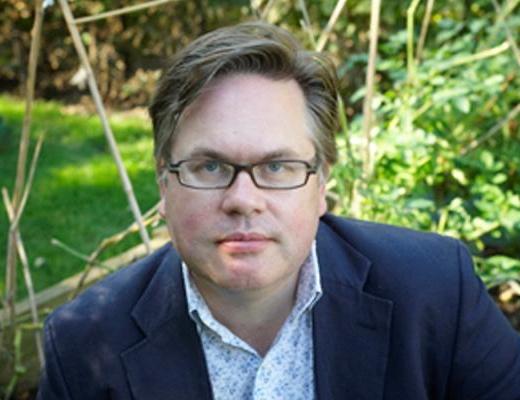
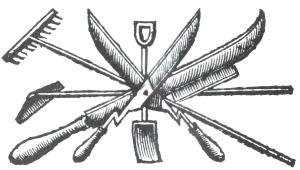
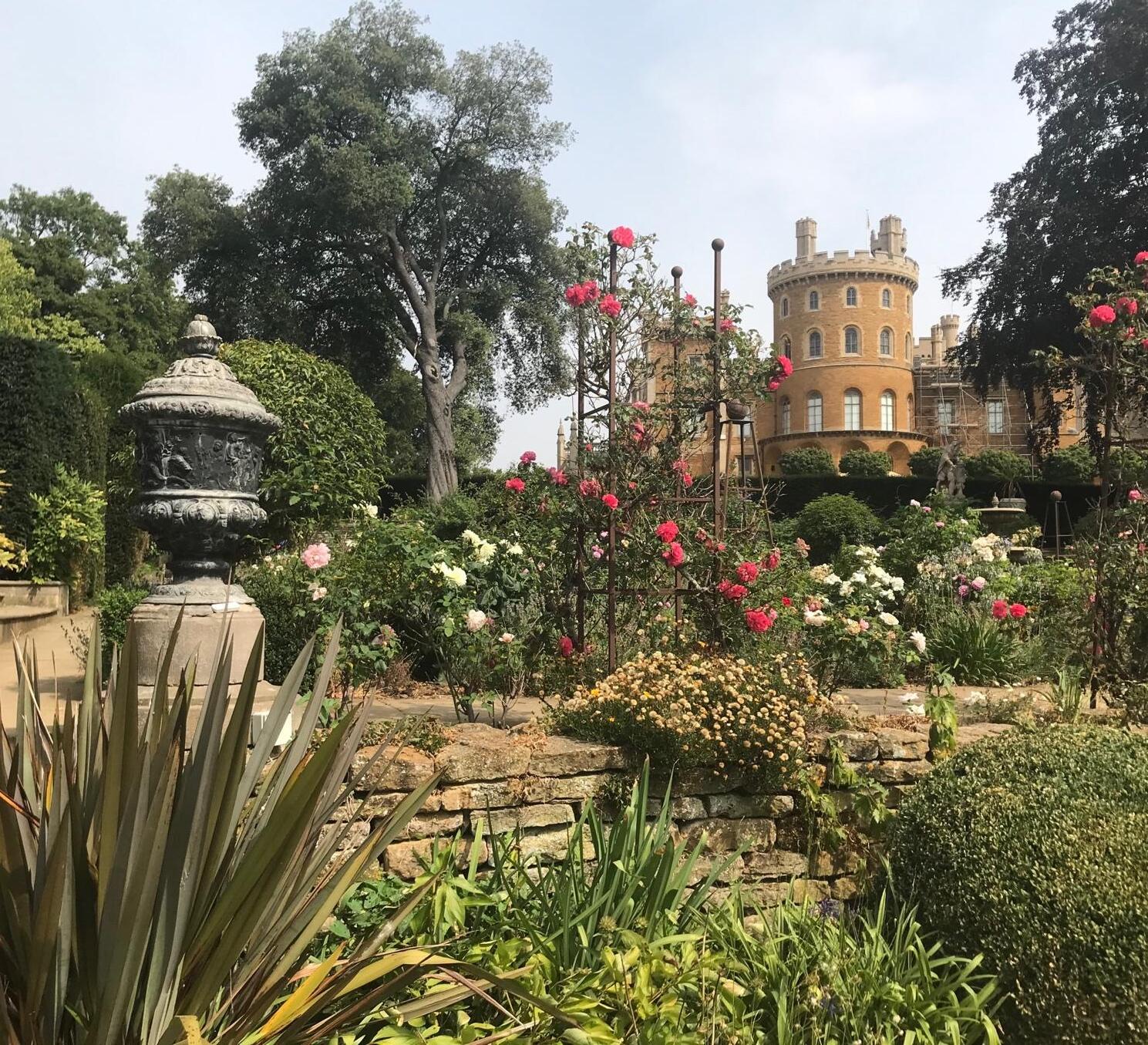
Seminars and Lectures
Seminar and Lectures take place at the University’s offices in Bloomsbury (51 Gower St, London, WC1E 6HJ), each beginning at 6:30 pm
Tutorials
Tutorials usually take place at the University’s offices in Bloomsbury or can take place online if the student prefers.
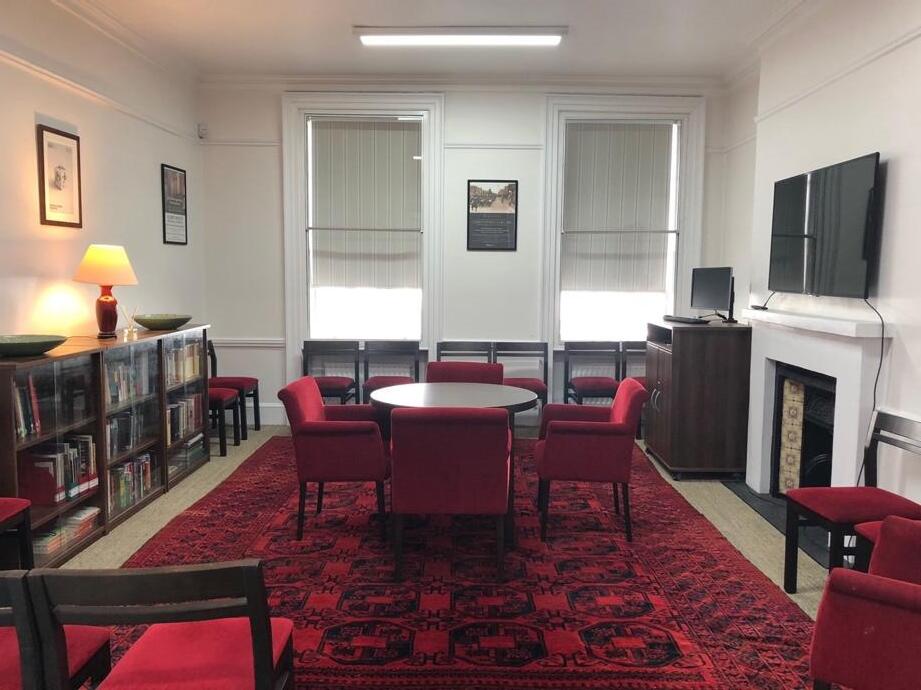
Master’s students who discover that they wish to take their research to a higher level have the opportunity, at the end of their year of study, to advance their research to doctoral level. Where the topic and the related evidence is appropriate, students are permitted to
treat their year of Master’s research as the first year of the three required for PhD study. If approved for this ‘upgrading’ to doctoral study, they may submit their expanded dissertation for the PhD degree after a further two years of writing and research.
Above: A seminar room at 51 Gower St.The usual requirement for admission to the MA is an honours-level bachelor’s degree from a recognized university with either a First or an Upper Second. In exceptional circumstances, the Course Director may accept mature students without an undergraduate degree if they have relevant and appropriately extensive workexperience, and can satisfy the Course Director at an interview that they are able to undertake graduate-level research. Two letters of reference are also requested; these will ideally be from academics who know the candidate, but where a significant time has elapsed since the applicant’s graduation, letters from a person holding a professional qualification will suffice.
who are recent graduates, a significant proportion of our students opt to undertake research during or after a successful career in another context.
Requests for further information
For questions about the application process, please email Ms Lin Robinson at the Graduate Admissions Office: lin.robinson@buckingham.ac.uk
For enquiries about research, please email the Course Director: david.marsh@buckingham.ac.uk
Starting the application process
There is a straightforward application process which is dealt with online. The application should be made through the University webpage for the MA in Garden History.
The University accepts appropriately qualified adults regardless of age.
While we regularly accept candidates
Doctoral candidates should apply through the PhD in Garden History webpage.
Applications from international students are welcomed. In addition to the standard application requirements set out above, they are also required to supply evidence that they have the appropriate visa (though this may be
provided after the application process is in train) and evidence that they have the appropriate level of written and spoken English. The Admissions Office can provide further details.
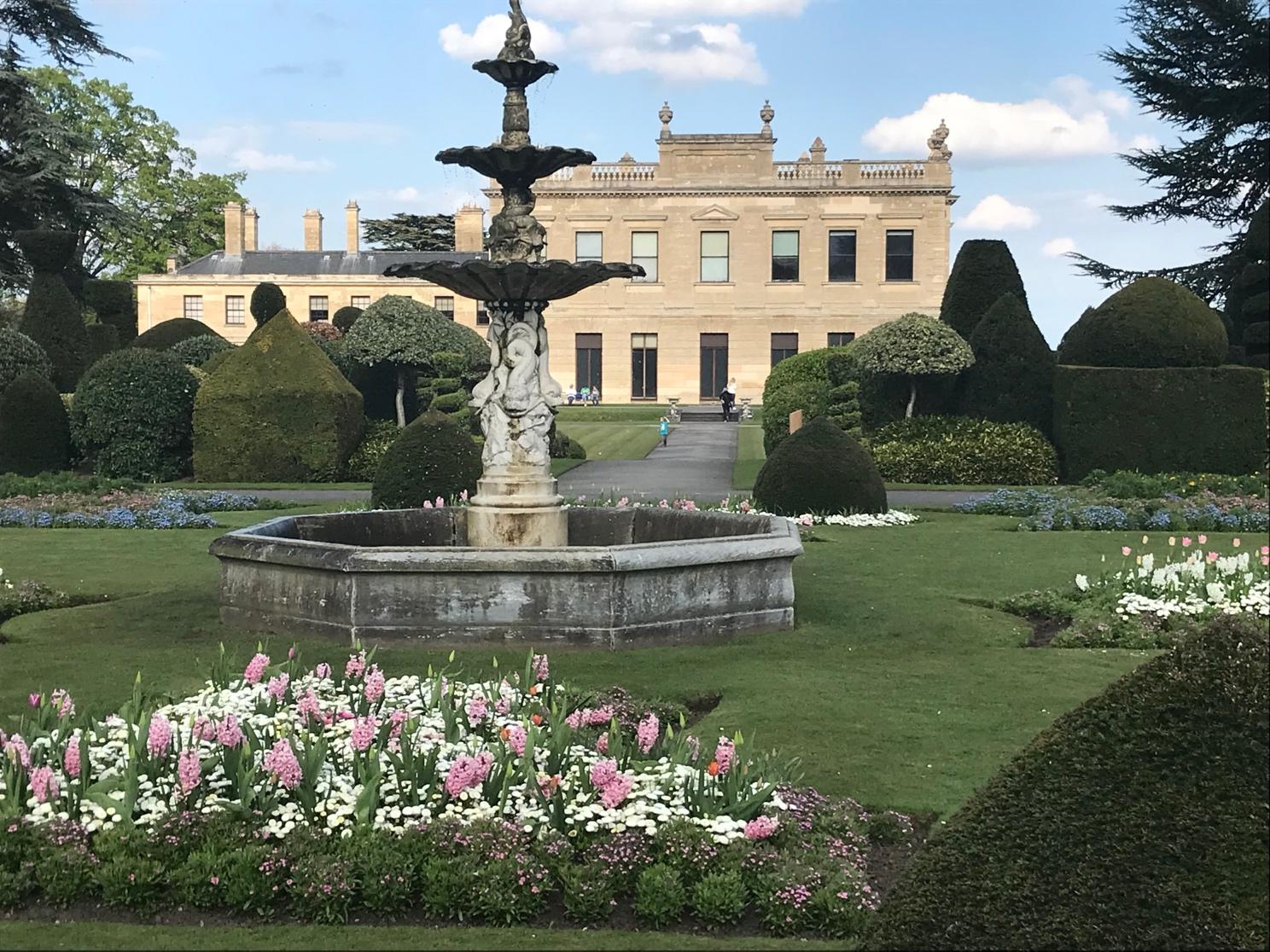 Below: The fountain at Brodsworth Hall. The hall was built between 1861 and 1863 for Charles Sabine Thellusson, whose great-grandfather Peter Thellusson, a merchant and banker, had bought the estate in 1791.
Below: The fountain at Brodsworth Hall. The hall was built between 1861 and 1863 for Charles Sabine Thellusson, whose great-grandfather Peter Thellusson, a merchant and banker, had bought the estate in 1791.
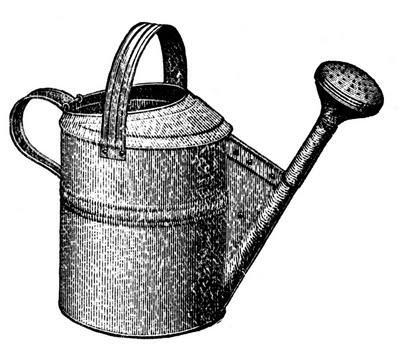
The University’s academic year, which begins in late September, has four Terms and fees are charged on a termly basis. The sums listed above are the totals for the full year.
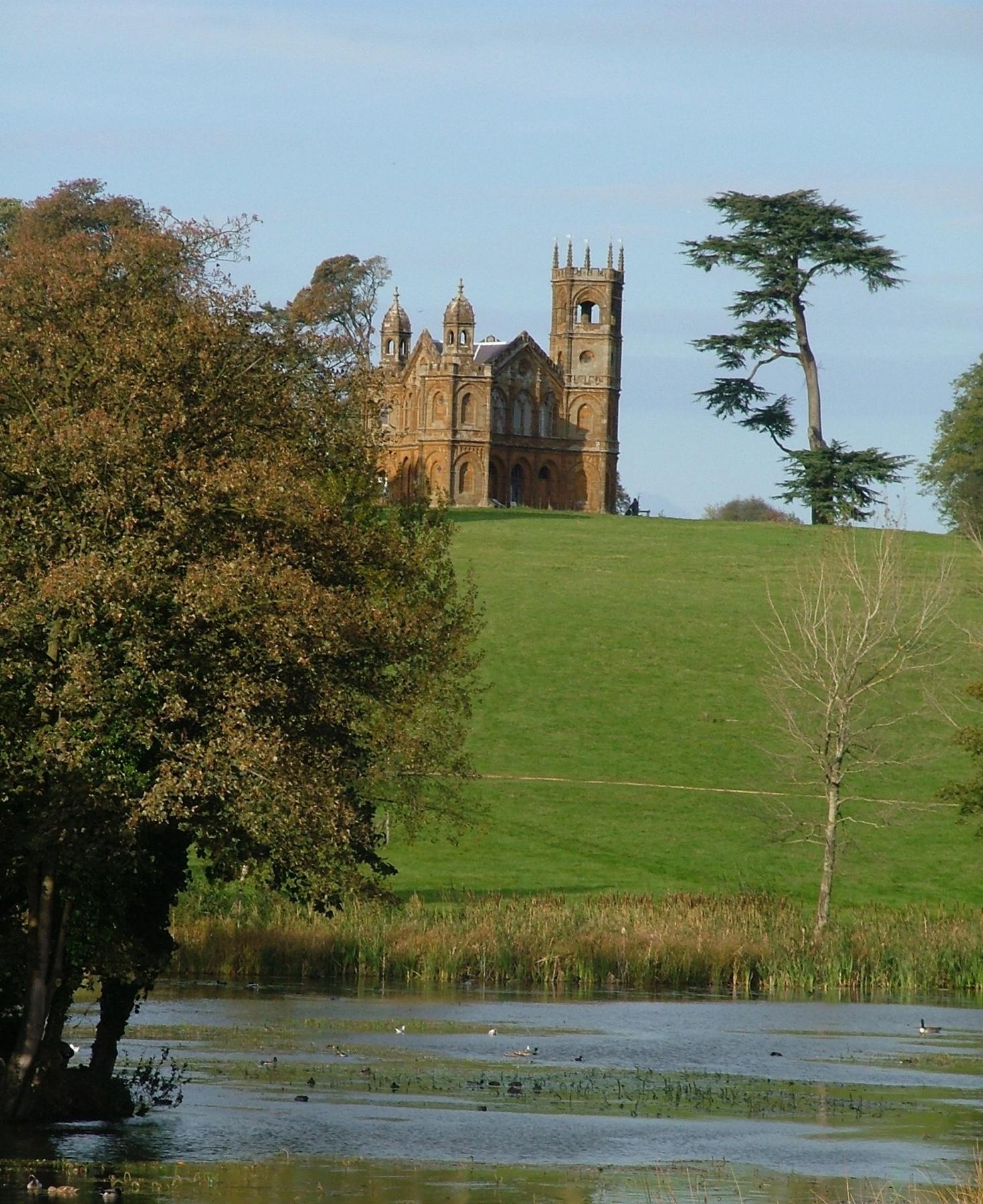 Above: The Gothic Temple, designed by James Gibbs and erected in 1741 in the gardens of Stowe House, Buckinghamshire. Stowe House is a little over a mile from the University of Buckingham.
Above: The Gothic Temple, designed by James Gibbs and erected in 1741 in the gardens of Stowe House, Buckinghamshire. Stowe House is a little over a mile from the University of Buckingham.
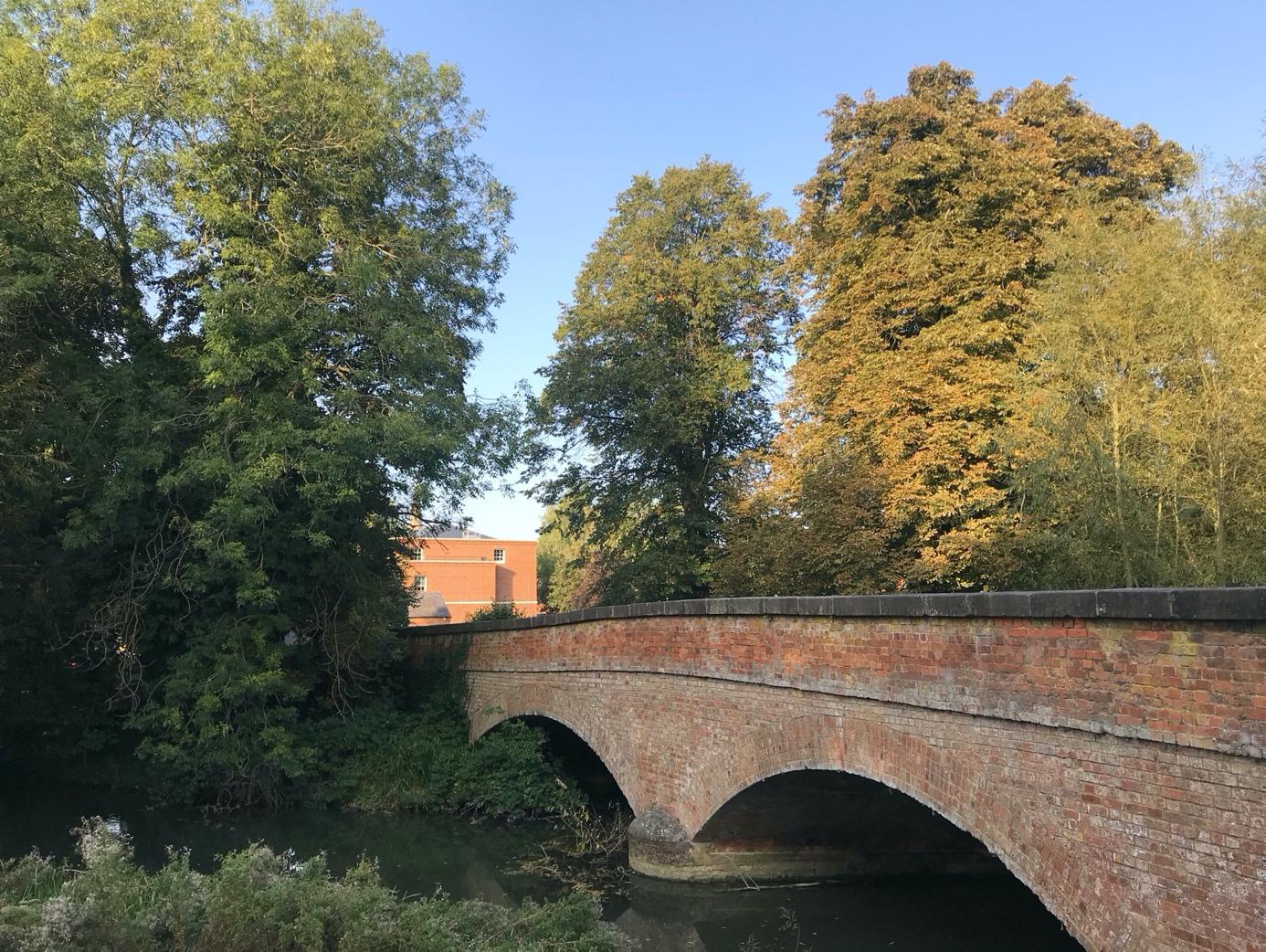
Founded in 1973 as a university college
‘on the pattern of [the] great private foundations in the USA’, Buckingham was granted full university status, with the power to confer degrees by royal charter, in 1983 the first independent university created since the 19th century. It is the only private university in the United Kingdom incorporated by royal charter.
From the start, the university was distinctive for its commitment to individual and small-group tutorial teaching, for the eminence of its academic body, and for its prizing of independence of thought and academic freedom. It currently has just over 3,000 students, almost evenly divided by undergraduates and graduate scholars.
The university is located in the centre of the historic market town of Buckingham, on a fine campus surrounded on three sides by the Great Ouse River, with extensive lawns and gardens. Much of the fabric of the university and the surrounding town in medieval, with a notable series of buildings surviving from the 18th century. For teaching purposes, the university also maintains offices in central London, in Gower St, Bloomsbury, which are used for tutorials and occasional seminars. The environs of the town are renowned for the distinction of the historic houses
nearby. Stowe House, former seat of the Dukes of Buckingham and Chandos, lies within walking distance of the main campus and offers one of the finest 18th-century, classically-inspired landscapes in the whole of Europe.
Above: the university’s Tanlaw Mill, a converted 19th-century mill which now houses the student bar and gymnasium.
Previous page: the Vinson Building, viewed from the university bridge across the Great Ouse.
